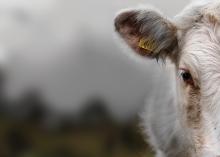Jason and Sandy Yuen grew up in traditional Chinese-Canadian homes where meals included meat, but today the Toronto couple and their three children follow a vegan diet.
“This is one way that our family can sort of live out in some small way what we think God’s will for us is,” Jason said. The Yuens shared their story during an online discussion hosted by Canadian Mennonite on March 20. Moderated by editor Will Braun, the discussion paired the Yuens with Clare Martens, who raises beef cattle in Manitoba.
The presenters explored the decisions behind their diets and how faith factors in.
Sandy started experimenting with a plant-based diet as an environmental studies student at the University of Waterloo. After learning about the impact of large-scale farming on the welfare of animals and the environment, she switched to a pescatarian diet (seafood but no other meat).
When the Yuens got married 18 years ago, Jason ate meat. In subsequent years, they were exposed to documentaries about plant-based eating that inspired them both to transition to a fully plant-based diet.
While some friends and family have struggled to understand the Yuens’ choice, they believe it aligns with God’s desire for humans to care for each other, animals and the earth.
Martens described her relationship to meat as both a producer and consumer.
She grew up on her family’s farm and returned there in 2018 after moving away for a few years. Since then, she’s worked alongside her father, sister and uncle, raising Charolais cattle and growing annual grain crops.
Martens and her partner regularly cook and eat meat and dairy products, and they enjoy catching and eating fish.
“I feel best about eating food we’ve had a hand in growing,” Martens said, noting that she grows a garden every year, goes berry picking with friends, loves to cook and enjoys sharing meals with friends. “I do feel conflicted about eating meat to a certain extent, although … I am proud of the way we produce meat.”
While Martens’ church experience has not included conversations about different ways of eating, she has vegetarian and vegan friends. She’s had fun learning to cook without meat, and she’s also appreciated the opportunity to invite those friends to the farm to see the cattle operation and ask questions.
“It feels sometimes a little bit vulnerable, but it is really neat to have those people out to the farm,” she said.
When Braun asked Martens what she feels people don’t understand about cattle ranching, she wasn’t sure how to respond. “I just know that some of the most gentle and most humane people I know are cattle farmers,” she said.
Jason said that one of the things people misunderstand about the Yuens is that they are open-minded when it comes to their beliefs about food.
“We’re not just coming from … an animal cruelty perspective or a bleeding-heart perspective,” he said. “But we try to be thoughtful about it.”
That spirit of open-mindedness permeated the discussion, which saw the participants readily admit that there are things about food production and consumption that they don’t know about—and that people’s approaches to thesetopics are heavily influenced by the environments in which they grow up.
“I really admire you for your dedication to the huge lifestyle change [you’ve made],” Martens told the Yuens. “I think that’s really cool and that’s something that I would like to emulate more in my own faith.”
Sandy said that she and her family continue to learn about food choices, and she encourages others to do the same.
“We all have to eat three times a day,” she said. “Let’s try to experiment, let’s try to explore.”
The Yuens encourage people leading environmental work in church contexts to consider questions of diet.
“We’ve got to talk about this as a church,” Jason said. “We can’t just live with the status quo.”
Braun’s hope for the event was to have healthy discussion on a topic everyone can relate to.
“We all eat every day, and we all make decisions about what to eat every day. The shelves are stocked with ethical dilemmas,” he said.
“There is tension in all of our lives and that’s sort of where I wanted to focus, to some extent,” he added later. “To the extent that we consume more than we need to, which is most of us, we contribute to a system that’s very, very hard on the earth—whether that involves large farms or not. I would want us all to sort of infuse our views with that bit of humility.”
Watch a recording of the event at tinyurl.com/cmmeat2024.




Add new comment
Canadian Mennonite invites comments and encourages constructive discussion about our content. Actual full names (first and last) are required. Comments are moderated and may be edited. They will not appear online until approved and will be posted during business hours. Some comments may be reproduced in print.